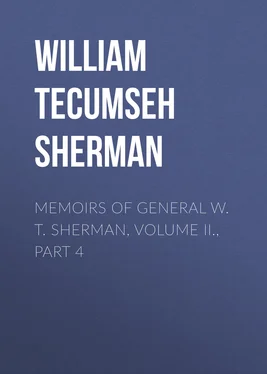William Tecumseh Sherman - Memoirs of General W. T. Sherman, Volume II., Part 4
Здесь есть возможность читать онлайн «William Tecumseh Sherman - Memoirs of General W. T. Sherman, Volume II., Part 4» — ознакомительный отрывок электронной книги совершенно бесплатно, а после прочтения отрывка купить полную версию. В некоторых случаях можно слушать аудио, скачать через торрент в формате fb2 и присутствует краткое содержание. Жанр: Биографии и Мемуары, История, foreign_edu, foreign_antique, foreign_prose, на английском языке. Описание произведения, (предисловие) а так же отзывы посетителей доступны на портале библиотеки ЛибКат.
- Название:Memoirs of General W. T. Sherman, Volume II., Part 4
- Автор:
- Жанр:
- Год:неизвестен
- ISBN:нет данных
- Рейтинг книги:5 / 5. Голосов: 1
-
Избранное:Добавить в избранное
- Отзывы:
-
Ваша оценка:
- 100
- 1
- 2
- 3
- 4
- 5
Memoirs of General W. T. Sherman, Volume II., Part 4: краткое содержание, описание и аннотация
Предлагаем к чтению аннотацию, описание, краткое содержание или предисловие (зависит от того, что написал сам автор книги «Memoirs of General W. T. Sherman, Volume II., Part 4»). Если вы не нашли необходимую информацию о книге — напишите в комментариях, мы постараемся отыскать её.
Memoirs of General W. T. Sherman, Volume II., Part 4 — читать онлайн ознакомительный отрывок
Ниже представлен текст книги, разбитый по страницам. Система сохранения места последней прочитанной страницы, позволяет с удобством читать онлайн бесплатно книгу «Memoirs of General W. T. Sherman, Volume II., Part 4», без необходимости каждый раз заново искать на чём Вы остановились. Поставьте закладку, и сможете в любой момент перейти на страницу, на которой закончили чтение.
Интервал:
Закладка:
Before I had reached Savannah, and during our stay there, the rebel officers and newspapers represented the conduct of the men of our army as simply infamous; that we respected neither age nor sex; that we burned every thing we came across–barns, stables, cotton-gins, and even dwelling-houses; that we ravished the women and killed the men, and perpetrated all manner of outrages on the inhabitants. Therefore it struck me as strange that Generals Hardee and Smith should commit their, families to our custody, and even bespeak our personal care and attention. These officers knew well that these reports were exaggerated in the extreme, and yet tacitly assented to these publications, to arouse the drooping energies of the people of the South.
As the division of Major-General John W. Geary, of the Twentieth Corps, was the first to enter Savannah, that officer was appointed to command the place, or to act as a sort of governor. He very soon established a good police, maintained admirable order, and I doubt if Savannah, either before or since, has had a better government than during our stay. The guard-mountings and parades, as well as the greater reviews, became the daily resorts of the ladies, to hear the music of our excellent bands; schools were opened, and the churches every Sunday were well filled with most devout and respectful congregations; stores were reopened, and markets for provisions, meat, wood, etc., were established, so that each family, regardless of race, color, or opinion, could procure all the necessaries and even luxuries of life, provided they had money. Of course, many families were actually destitute of this, and to these were issued stores from our own stock of supplies. I remember to have given to Dr. Arnold, the mayor, an order for the contents of a large warehouse of rice, which he confided to a committee of gentlemen, who went North (to Boston), and soon returned with one or more cargoes of flour, hams, sugar, coffee, etc., for gratuitous distribution, which relieved the most pressing wants until the revival of trade and business enabled the people to provide for themselves.
A lady, whom I had known in former years as Miss Josephine Goodwin, told me that, with a barrel of flour and some sugar which she had received gratuitously from the commissary, she had baked cakes and pies, in the sale of which she realized a profit of fifty-six dollars.
Meantime Colonel Poe had reconnoitred and laid off new lines of parapet, which would enable a comparatively small garrison to hold the place, and a heavy detail of soldiers was put to work thereon; Generals Easton and Beckwith had organized a complete depot of supplies; and, though vessels arrived almost daily with mails and provisions, we were hardly ready to initiate a new and hazardous campaign. I had not yet received from General Grant or General Halleck any modification of the orders of December 6,1864, to embark my command for Virginia by sea; but on the 2d of January, 1865, General J. G. Barnard, United States Engineers, arrived direct from General Grant's headquarters, bearing the following letter, in the general's own handwriting, which, with my answer, is here given:
HEADQUARTERS ARMIES OF THE UNITED STATES
CITY POINT, VIRGINIA, December 27, 1864.
Major-General W. T. SHERMAN, commanding Military Division of the Mississippi.
GENERAL: Before writing you definite instructions for the next campaign, I wanted to receive your answer to my letter written from Washington. Your confidence in being able to march up and join this army pleases me, and I believe it can be done. The effect of such a campaign will be to disorganize the South, and prevent the organization of new armies from their broken fragments. Hood is now retreating, with his army broken and demoralized. His loss in men has probably not been far from twenty thousand, besides deserters. If time is given, the fragments may be collected together and many of the deserters reassembled. If we can, we should act to prevent this. Your spare army, as it were, moving as proposed, will do it.
In addition to holding Savannah, it looks to me that an intrenched camp ought to be held on the railroad between Savannah and Charleston. Your movement toward Branchville will probably enable Foster to reach this with his own force. This will give us a position in the South from which we can threaten the interior without marching over long, narrow causeways, easily defended, as we have heretofore been compelled to do. Could not such a camp be established about Pocotaligo or Coosawhatchie?
I have thought that, Hood being so completely wiped out for present harm, I might bring A. J. Smith here, with fourteen to fifteen thousand men. With this increase I could hold my lines, and move out with a greater force than Lee has. It would compel Lee to retain all his present force in the defenses of Richmond or abandon them entirely. This latter contingency is probably the only danger to the easy success of your expedition. In the event you should meet Lee's army, you would be compelled to beat it or find the sea-coast. Of course, I shall not let Lee's army escape if I can help it, and will not let it go without following to the best of my ability.
Without waiting further directions, than, you may make your preparations to start on your northern expedition without delay. Break up the railroads in South and North Carolina, and join the armies operating against Richmond as soon as you can. I will leave out all suggestions about the route you should take, knowing that your information, gained daily in the course of events, will be better than any that can be obtained now.
It may not be possible for you to march to the rear of Petersburg; but, failing in this, you could strike either of the sea-coast ports in North Carolina held by us. From there you could take shipping. It would be decidedly preferable, however, if you could march the whole distance.
From the best information I have, you will find no difficulty in supplying your army until you cross the Roanoke. From there here is but a few days' march, and supplies could be collected south of the river to bring you through. I shall establish communication with you there, by steamboat and gunboat. By this means your wants can be partially supplied. I shall hope to hear from you soon, and to hear your plan, and about the time of starting.
Please instruct Foster to hold on to all the property in Savannah, and especially the cotton. Do not turn it over to citizens or Treasury agents, without orders of the War Department.
Very respectfully, your obedient servant,
U. S. GRANT, Lieutenant-General.
HEADQUARTERS MILITARY DIVISION OF THE MISSISSIPPI,
IN THE FIELD, NEAR SAVANNAH, GEORGIA, January 2, 1865.
Lieutenant-General U. S. GRANT, City Point.
GENERAL: I have received, by the hands of General Barnard, your note of 26th and letter of 27th December.
I herewith inclose to you a copy of a projet which I have this morning, in strict confidence, discussed with my immediate commanders.
I shall need, however, larger supplies of stores, especially grain. I will inclose to you, with this, letters from General Easton, quartermaster, and Colonel Beckwith, commissary of subsistence, setting forth what will be required, and trust you will forward them to Washington with your sanction, so that the necessary steps may be taken at once to enable me to carry out this plan on time.
I wrote you very fully on the 24th, and have nothing to add. Every thing here is quiet, and if I can get the necessary supplies in our wagons, shall be ready to start at the time indicated in my projet (January 15th). But, until those supplies are in hand, I can do nothing; after they are, I shall be ready to move with great rapidity.
I have heard of the affair at Cape Fear. It has turned out as you will remember I expected.
Читать дальшеИнтервал:
Закладка:
Похожие книги на «Memoirs of General W. T. Sherman, Volume II., Part 4»
Представляем Вашему вниманию похожие книги на «Memoirs of General W. T. Sherman, Volume II., Part 4» списком для выбора. Мы отобрали схожую по названию и смыслу литературу в надежде предоставить читателям больше вариантов отыскать новые, интересные, ещё непрочитанные произведения.
Обсуждение, отзывы о книге «Memoirs of General W. T. Sherman, Volume II., Part 4» и просто собственные мнения читателей. Оставьте ваши комментарии, напишите, что Вы думаете о произведении, его смысле или главных героях. Укажите что конкретно понравилось, а что нет, и почему Вы так считаете.












